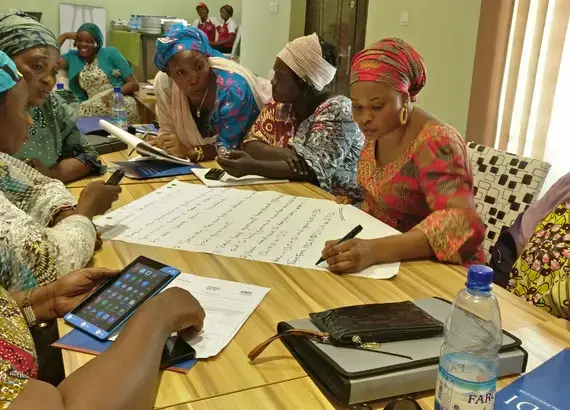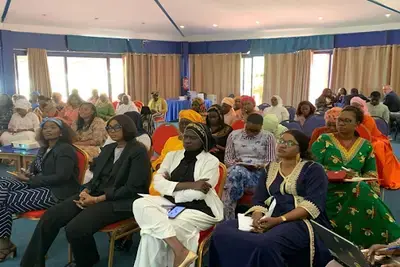
In Adamawa state, Nigeria, female political aspirants brainstorm on how to lobby party delegates to secure nominations ahead of the 2019 general elections.
Success Story
Winds of Change: Female Political Aspirants in Adamawa State, Nigeria
Adamawa state in northeast Nigeria is experiencing an increase in the number of women joining political parties and participating actively in politics. The social landscape of the region is traditional, conservative and male-dominated. As a result, it is a context in which women have long been marginalized from political and electoral processes. Ordinarily, expectations for women’s political participation would be very low.
But women in Adamawa are swimming fast against that tide. Honorable Wilbena Jackson, a former member of the Adamawa State House of Assembly (SHoA), confirmed that women have increasingly joined political parties and registered with the election commission to get their voter cards. Jackson says the greatest strength and potential of women in Adamawa is their ability to mobilize themselves and others.
One of the largest states of Nigeria, Adamawa has only five women in 58 elected offices in all of its local government councils, its state assembly and the national legislature. Its low number of elected women representatives is symptomatic of a larger national problem. In 2017, according to UN Women and the Inter-Parliamentary Union, Nigeria ranked a low 180 out of 190 countries worldwide for the number of women in parliament. It is the lowest of any other country in Africa.
Adamawa is also an especially challenging state for women to make political inroads for other reasons. With an economy driven by male-dominated trades like farming, cattle herding and fishing, Adamawa also entered a state of emergency in May 2013 due to the Boko Haram insurgency, which has caused the displacement of some 136,000 people fleeing violence. If obstacles presented by traditional gender roles were not already enough, insecurity from the insurgency has marginalized women even further from challenging men for public offices. In Adamawa, as with any other environment, women’s political representation and empowerment are essential for equitable and sustainable development for women as well as men.
Beginning in 2016, the Women in Politics (WiP) project of the National Democratic Institute for International Affairs (NDI) set out to help women take on such challenges. In Nigeria, with the support of UKAID, NDI works to improve women’s political participation in six states, including Adamawa. Under WiP, NDI has mentored and trained female aspirants for electoral office. The WiP project has also provided support to elected women to strengthen constituency relations through constituency office management, town hall meetings, and improved media relations. The project is also supporting political party women leaders to advocate for women’s quotas and other measures to encourage women’s political participation within political parties. A new corps of female politicians is emerging, with stronger potential to contest in future elections. Under the project, NDI has reached about 200 aspirants thus far.
In Adamawa, WiP participants from seven political parties recently formed the Adamawa Female Aspirants Group to support each other in their common cause and to speak with one voice about the need for political parties to promote women candidates. Female aspirants coming together in that way, with different political beliefs, affiliations and values, is a first in Adamawa, and undoubtedly a model for many other states as well.
The Adamawa Female Aspirants Group has made women aspirants and politicians a force to be reckoned with in the state, says Hon. Tina Thomas, a former local councilor from the Numan Local Government Authority (LGA). In 2016, Thomas ran as the only woman from Adamawa State’s 21 LGAs, as a candidate for LGA chairperson. Unfortunately, she lost to a male contestant. But like the African baobab tree, her passion and determination are deeply rooted to ensure that women get equal rights and opportunities as compared to men in the political arena. According to Thomas, women in Adamawa are increasingly gaining the confidence to lead other women, as well as to live their lives as public servants and to build their identities as politicians and political leaders.
It wasn’t easy at first, because we are different women from different parties. We saw each other as threats because of our party differences. The WiP team made us understand many ways of organizing our campaigns, how to win against the opponent and how to speak with one voice and attend strategic meetings. The women agreed with each other about the inter-party group, and networking then became very easy. Here we are today speaking with one voice, working toward gender inclusion in our political party constitutions to open up space for women.
- Hon. Tina Thomas, Numan LGA
Hon. Wilbena Jackson also shared how women in Adamawa had come to hold a very narrow view of elected offices, as merely vehicles for execution of micro-projects in communities, rather than representational and policymaking roles of larger significance. WiP provided a platform for cross-fertilization of ideas that challenged women to build political bridges and to learn from the experiences of other women, she said. Being a female politician in northern Nigeria is about being courageous, organized and resilient, according to Jackson.
We realized that as a woman you have to understand the nitty gritty that informs what it takes to have a voice in the political party and what it takes to win election.
- Hon. Wilbena Jackson, Adamawa SHoA
Jackson further emphasized the role of political education for women to be competitive in a political space dominated by men. According to her, education is necessary not only for candidates, but also for community women who require knowledge about voter registration and the processes for accessing permanent voter cards and joining political parties.
Female political aspirants in Adamawa state don’t want to be pitied to win any office, they understand that a woman has to put in double effort compared to that of a man in order to win elections and be respected as a candidate for office.
- Hon. Jackson
Consistency and reliability being her keywords, Jackson has herself mentored other women in the state to base their campaigns on core values in order to be taken seriously.
All the men in my political party have moved from one party to another within short spans. I never changed my party. I managed my time well. Even as a State House of Assembly member, all my projects were duly completed. Today any group I mobilize is taken seriously because everyone believes in my consistency and reliability.
- Hon. Jackson
Hon. Tina Thomas is also an active mentor. She is helping women to devise unique campaign tactics, such as seeking out male allies and engaging religious leaders to enlighten them on women’s policy objectives. She also enlists their support to ensure a safe political environment for women candidates and women voters. Thomas has formed a social media networking group with women who did not participate in NDI’s trainings, to help ensure the movement for women’s political inclusion has a ripple effect and to encourage others to join politics.
Both Jackson and Thomas believe that women are growing increasingly interested to participate in politics. They now have in mind that politics is a game of numbers and that if women vote in significant numbers, they can be the deciding factor in any electoral race.
Women in politics in Nigeria, as elsewhere, face discrimination, harassment and even violence -- psychological, physical, and sexual violence. Such abuses are prevalent within political parties, just as they are within communities and households. They have adopted unique campaign tactics to engage the necessary stakeholders (religious leaders and political party leaders) to join forces in combatting and overcoming the challenges they face in the political space. They are promoting their unique value as political leaders through the media, through community organizations and within political parties, both as candidates and as voters. Women are more aware than others of how much more still has to be done to achieve attitudinal change. And the wind of change is blowing in Adamawa.



